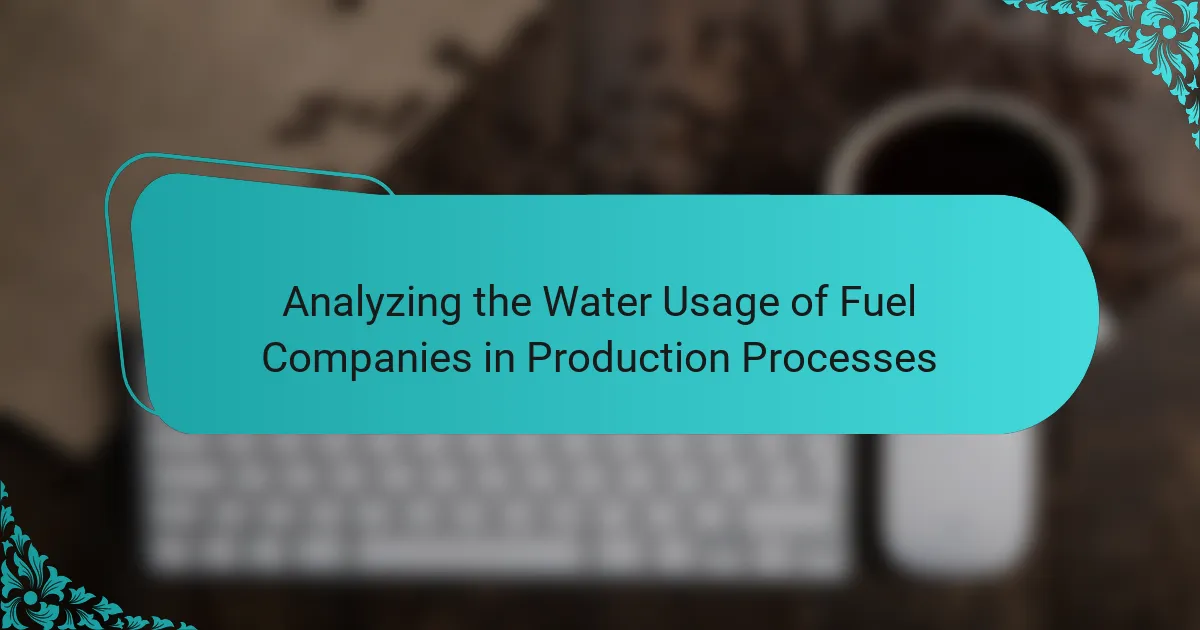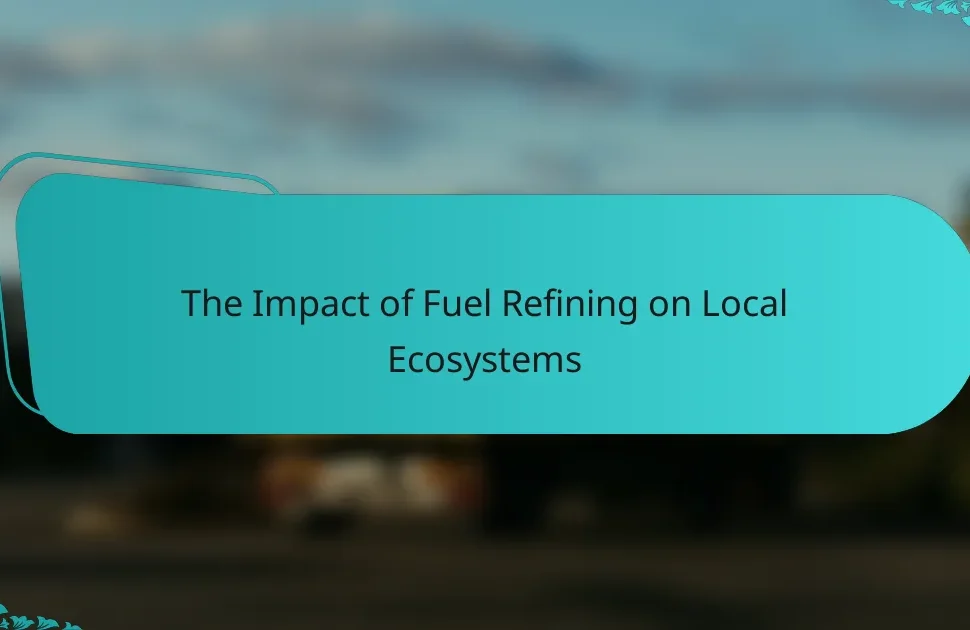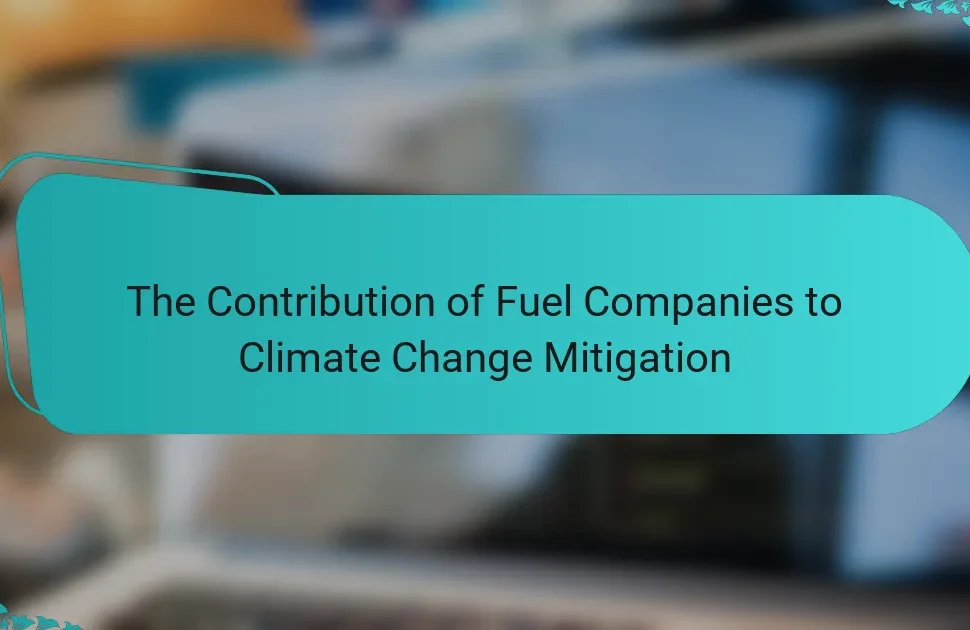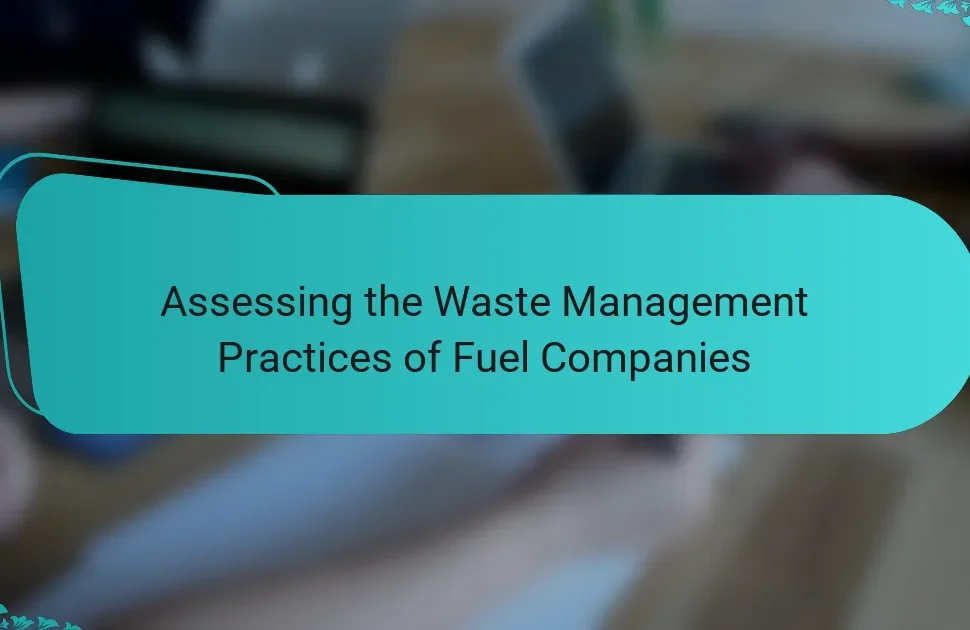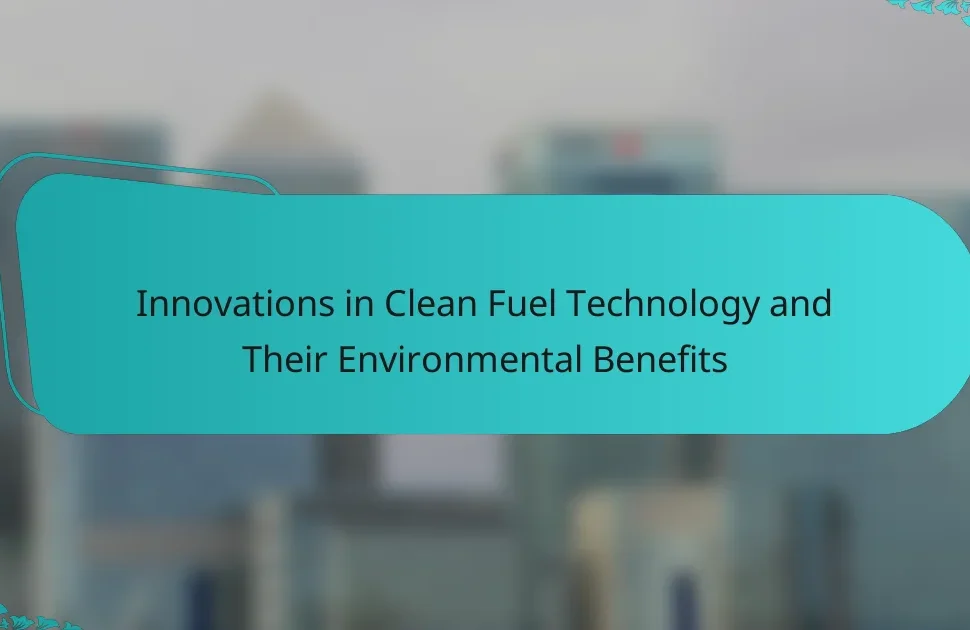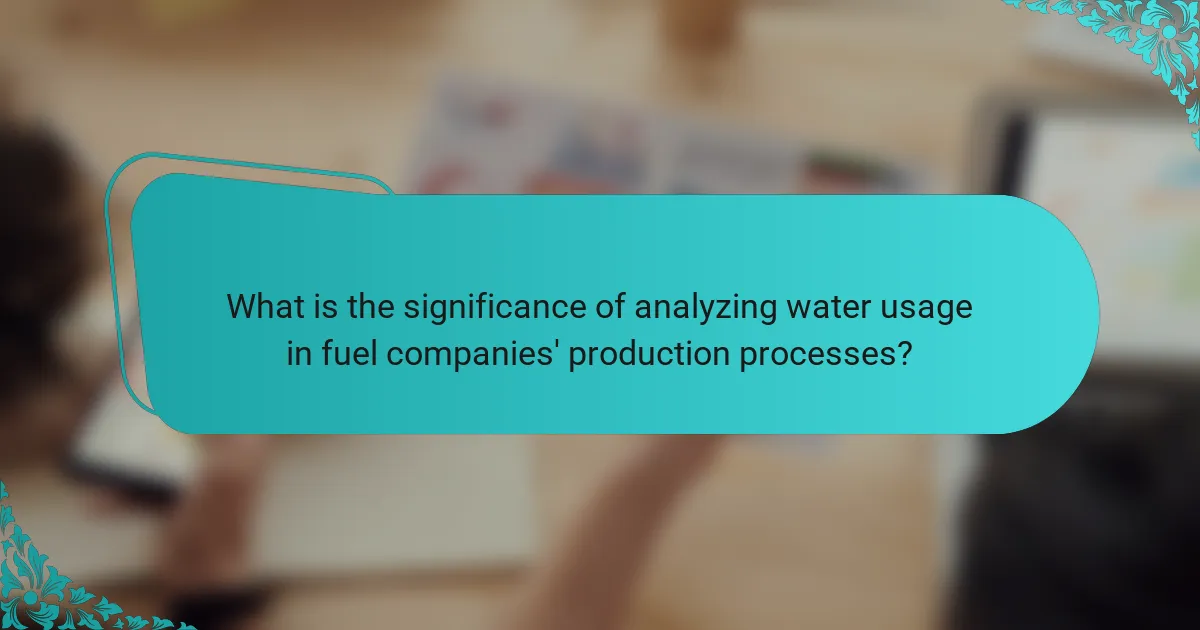
What is the significance of analyzing water usage in fuel companies’ production processes?
Analyzing water usage in fuel companies’ production processes is significant for sustainability and efficiency. Water is a critical resource in fuel production. Companies often use large volumes of water for cooling, processing, and cleaning. High water consumption can lead to environmental impacts and regulatory challenges. Monitoring water usage helps identify waste and areas for conservation. It also aids in compliance with environmental regulations. Efficient water management can reduce operational costs. Studies show that optimizing water use can improve overall production efficiency. Therefore, analyzing water usage is essential for responsible resource management in fuel production.
How does water usage impact the overall production efficiency of fuel companies?
Water usage significantly impacts the overall production efficiency of fuel companies. Efficient water management can enhance production processes by reducing operational costs. Water is essential for cooling, processing, and transporting fuel. Inefficient water usage can lead to increased energy consumption and higher costs. For instance, companies that recycle water can lower their intake needs and minimize waste. According to the U.S. Geological Survey, water-intensive operations can account for up to 80% of total production costs in some fuel sectors. Therefore, optimizing water usage directly correlates with improved efficiency and profitability in fuel production.
What are the key stages in fuel production that require water?
The key stages in fuel production that require water include extraction, refining, and cooling. During extraction, water is used for hydraulic fracturing in oil and gas production. This process can consume millions of gallons of water. In refining, water is essential for various processes such as distillation and cooling. Water is also used to remove impurities from crude oil. Cooling systems in refineries require significant amounts of water to manage heat generated during processing. These stages highlight the critical role of water in fuel production.
How does the volume of water used correlate with production outputs?
The volume of water used directly influences production outputs in fuel companies. Increased water usage typically enhances the efficiency of extraction and processing methods. For instance, hydraulic fracturing requires substantial water to maximize oil and gas yields. Studies show that higher water volumes can lead to increased production rates, as seen in the 2016 report by the U.S. Energy Information Administration. This report indicated that water-intensive methods improved output by up to 30% in certain regions. Furthermore, optimizing water use can lead to cost savings and improved sustainability. Therefore, a clear correlation exists between water volume and production effectiveness in the fuel industry.
Why is it important to monitor water usage in the fuel industry?
Monitoring water usage in the fuel industry is crucial for sustainability and resource management. The fuel industry relies heavily on water for various processes, including extraction, refining, and cooling. Efficient water usage minimizes environmental impact and reduces operational costs. Over-extraction of water can lead to resource depletion and ecological damage. Tracking water consumption helps identify inefficiencies and promotes conservation efforts. Regulatory compliance often requires fuel companies to report water usage. According to the World Resources Institute, the fuel sector is a significant contributor to global water stress. Monitoring ensures that companies adhere to best practices and mitigate risks associated with water scarcity.
What environmental impacts arise from excessive water usage in fuel production?
Excessive water usage in fuel production leads to significant environmental impacts. It can result in water scarcity, affecting local ecosystems and communities. High water consumption can deplete rivers and aquifers, reducing water availability for agriculture and drinking. Additionally, contaminated wastewater from fuel production can pollute nearby water sources. This pollution harms aquatic life and disrupts ecosystems. Moreover, excessive water extraction can cause land subsidence, damaging infrastructure. According to the World Resources Institute, regions with high water stress face increased competition for water resources. This competition can exacerbate conflicts between industries and local populations.
How does water management affect regulatory compliance for fuel companies?
Water management directly impacts regulatory compliance for fuel companies. Effective water management ensures that companies adhere to environmental regulations. Regulations often mandate limits on water usage and discharge quality. Non-compliance can result in fines and legal penalties. For instance, the Clean Water Act in the U.S. sets strict guidelines for water discharge. Companies must monitor their water use and treatment processes. Poor management can lead to violations and increased scrutiny from regulatory bodies. Therefore, proper water management is essential for maintaining compliance and avoiding sanctions.
What methodologies are used to analyze water usage in fuel production?
Methodologies to analyze water usage in fuel production include water footprint assessment, life cycle analysis, and remote sensing techniques. Water footprint assessment quantifies direct and indirect water use throughout the production process. Life cycle analysis evaluates environmental impacts, including water consumption, from extraction to end-use. Remote sensing techniques utilize satellite data to monitor water usage and availability in fuel production regions. These methodologies provide insights into water efficiency and sustainability in fuel production. Studies demonstrate that implementing these methods can lead to significant reductions in water usage, enhancing resource management.
What tools and technologies are available for water usage monitoring?
Smart water meters are essential tools for water usage monitoring. These devices provide real-time data on water consumption. They can detect leaks and inefficiencies in water use. Automated meter reading (AMR) technology enhances data collection efficiency. Sensors and IoT devices facilitate remote monitoring of water usage. Data analytics software interprets water consumption patterns. Mobile applications allow users to track their water usage easily. Cloud-based platforms enable centralized data management and reporting.
How can data analytics improve water usage efficiency in fuel companies?
Data analytics can significantly improve water usage efficiency in fuel companies by providing insights into consumption patterns. By analyzing historical water usage data, companies can identify trends and anomalies. This allows for better forecasting of water needs during production processes. Predictive analytics can optimize scheduling to minimize unnecessary water use. Real-time monitoring can detect leaks and inefficiencies, leading to immediate corrective actions. Additionally, analytics can facilitate benchmarking against industry standards, driving continuous improvement. Research shows that companies utilizing data analytics can reduce water consumption by up to 20%, enhancing sustainability and operational efficiency.
What are the trends in water usage among leading fuel companies?
Leading fuel companies are increasingly focusing on reducing water usage in their production processes. Many are implementing water recycling and reuse systems to minimize freshwater consumption. For instance, companies like ExxonMobil and Shell have reported a significant decrease in water withdrawal by adopting advanced technologies. According to the World Resources Institute, the oil and gas sector has improved water efficiency by approximately 30% over the past decade. Additionally, some firms are investing in alternative cooling technologies to decrease reliance on water. The trend also includes assessing water risks in operations, particularly in water-scarce regions. This shift reflects a growing awareness of the environmental impacts and regulatory pressures related to water usage.
How do different fuel production methods impact water consumption rates?
Different fuel production methods significantly impact water consumption rates. For example, conventional oil extraction typically requires less water compared to biofuel production. Oil extraction processes often use around 1-2 barrels of water per barrel of oil produced. In contrast, biofuel production can consume up to 5,000 gallons of water per million BTUs. Natural gas extraction through hydraulic fracturing can also lead to high water usage, averaging 1-5 million gallons per well. Additionally, coal mining and processing can require substantial water for dust suppression and cooling. These variations highlight the importance of evaluating water use across different fuel production methods.
What best practices are being adopted by fuel companies to reduce water usage?
Fuel companies are adopting several best practices to reduce water usage. These practices include implementing closed-loop water systems. Closed-loop systems recycle water within the production process, minimizing freshwater intake. Another practice is using advanced cooling technologies that require less water. Companies are also investing in water-efficient technologies for extraction and processing.
Additionally, many fuel companies conduct regular water audits to identify areas for improvement. They set measurable water reduction targets based on these audits. Collaborating with local communities to promote water conservation is another effective strategy. These measures collectively lead to significant reductions in overall water consumption in fuel production processes.
What challenges do fuel companies face in managing water resources?
Fuel companies face significant challenges in managing water resources. One major challenge is regulatory compliance. Strict environmental regulations require companies to monitor and limit water usage. Another challenge is water scarcity in certain regions. This limits the availability of freshwater for operations. Additionally, fuel companies often face public scrutiny regarding their water management practices. Communities may oppose operations that threaten local water supplies. Furthermore, the impact of climate change exacerbates water resource challenges. Extreme weather events can disrupt water availability and quality. Lastly, the need for sustainable practices is increasingly important. Companies must balance operational needs with environmental stewardship. These challenges necessitate innovative solutions for effective water resource management.
How do geographical factors influence water availability for fuel production?
Geographical factors significantly influence water availability for fuel production. Regions with abundant freshwater resources support higher fuel production rates. Areas with a dry climate face water scarcity, limiting production capabilities. Proximity to rivers and lakes enhances access to water for processing. Elevation and topography can affect rainfall patterns and runoff. For example, mountainous regions may experience less water availability due to precipitation patterns. Additionally, soil types impact water retention and availability for irrigation in fuel crop production. Regions with sustainable water management practices can optimize water use effectively. Studies show that regions with effective water management have higher fuel production efficiency.
What strategies can fuel companies implement to overcome water scarcity issues?
Fuel companies can implement several strategies to overcome water scarcity issues. First, they can adopt water-efficient technologies in their production processes. These technologies can significantly reduce water consumption by recycling and reusing water. Secondly, companies can invest in rainwater harvesting systems. This approach allows them to collect and store rainwater for operational use.
Additionally, fuel companies can engage in partnerships with local communities. These collaborations can lead to sustainable water management practices that benefit both parties. Moreover, implementing water stewardship programs can enhance their water-use efficiency. Such programs promote responsible water management and conservation efforts.
Finally, conducting regular water audits can help identify areas for improvement. These audits provide insights into water usage patterns and potential savings. According to the World Resources Institute, industries that adopt these strategies can reduce their water footprint by up to 50%.
What practical steps can fuel companies take to optimize water usage in their production processes?
Fuel companies can optimize water usage in their production processes by implementing several practical steps. First, they can conduct a comprehensive water audit to identify areas of excessive use. This audit allows companies to pinpoint inefficiencies and prioritize improvements. Second, adopting closed-loop water systems can significantly reduce water waste. These systems recycle water within the production process, minimizing fresh water intake. Third, investing in water-efficient technologies, such as advanced cooling systems and low-water-use equipment, can enhance efficiency. Fourth, training employees on water conservation practices can promote a culture of sustainability within the organization. Moreover, establishing partnerships with local water management authorities can provide insights into best practices and regulatory compliance. Lastly, setting measurable water reduction targets can help track progress and encourage accountability. These steps are supported by industry studies indicating that water-efficient practices can lead to significant cost savings and resource conservation.
The main entity of this article is the analysis of water usage in fuel companies’ production processes. The article highlights the significance of water as a critical resource in fuel production and its impact on sustainability, efficiency, and regulatory compliance. It discusses key stages of production that require water, the correlation between water volume and production outputs, and the environmental implications of excessive water use. Additionally, the article explores methodologies for analyzing water usage, best practices for optimization, challenges faced by companies, and strategies to overcome water scarcity issues.
